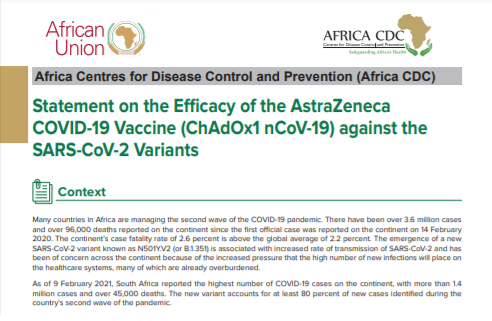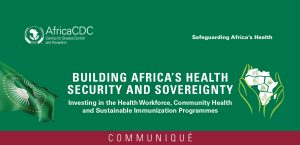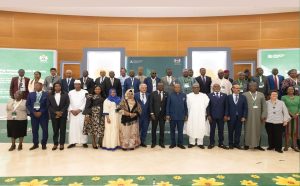Context:
Many countries in Africa are managing the second wave of the COVID-19 pandemic. There have been over 3.6 million cases and over 96,000 deaths reported on the continent since the first official case was reported on the continent on 14 February 2020. The continent’s case fatality rate of 2.6 percent is above the global average of 2.2 percent. The emergence of a new SARS-CoV-2 variant known as N501Y.V2 (or B.1.351) is associated with increased rate of transmission of SARS-CoV-2 and has been of concern across the continent because of the increased pressure that the high number of new infections will place on the healthcare systems, many of which are already overburdened.
As of 9 February 2021, South Africa reported the highest number of COVID-19 cases on the continent, with more than 1.4 million cases and over 45,000 deaths. The new variant accounts for at least 80 percent of new cases identified during the country’s second wave of the pandemic.
On 22 January 2021, the South African Regulatory Agency granted emergency use authorization for COVISHIELD (University of Oxford/AstraZeneca vaccine manufactured by Serum Institute of India).
On 1 February 2021, the first consignment of one million doses of the University of Oxford/AstraZeneca vaccine manufactured by Serum Institute of India was delivered to the South Africa.
On 7 February 2021, the South African Government announced a temporary hold to the rollout of the University of Oxford/AstraZeneca vaccine manufactured by Serum Institute of India following reports that the vaccine only offered “minimal protection” against mild and moderate cases of COVID-19 infections. This was based on a study conducted by a team at the University of the Witwatersrand, South Africa.
Findings from the South Africa study
The AstraZeneca vaccine (ChAdOx1 nCoV-19) is a human adenovirus vector-based vaccine that targets the spike protein of the SARS-CoV-2 virus. Phase III trial of the vaccine candidate demonstrated an overall efficacy of 66.7% in the age group 18-55 years.
A placebo-controlled phase I/II trial was conducted by South Africa’s University of Witwatersrand in collaboration with Oxford University. The study recruited 2000 relatively healthy and young volunteers with a median age of 31 years and with few comorbidities. The aim of the trial was to assess the safety, immunogenicity and efficacy of the AstraZeneca vaccine for the prevention of COVID-19 caused by the predominantly circulating new SARS-CoV-2 variant (N501Y.V2 or B.1.351).
Preliminary findings presented on 7 February 2021 indicate that:
- None of the participants who received either the vaccine or the placebo developed severe disease nor required hospitalization.
- The efficacy of the vaccine against mild and moderate COVID-19 disease (defined as at least one symptom of COVID-19) was 21.9% (CI: -49.9–59.8). This efficacy was below the minimal efficacy threshold of 50 percent recommended for emergency use of a vaccine candidate.
- Viral neutralization induced by the sera of the vaccine against the new SARS-CoV-2 variant (N501Y.V2 or B.1.351) was reduced when compared with the previous strain of the coronavirus.
- Protection against moderate-severe disease, hospitalization or death could not be assessed in this study as the target population was at low risk.
What do these findings mean?
Is the AstraZeneca vaccine efficacious against infection with the SARS-CoV-2 N501Y.V2 (or B.1.351) variant?
- These preliminary results indicate that the SARS-CoV-2 N501Y.V2 (or B.1.351) variant may evade antibody immune responses induced by the AstraZeneca vaccine.
- These findings support concerns that some COVID-19 vaccines may have reduced effectiveness against mild to moderate infection caused by the new SARS-CoV-2 variant (N501Y.V2 or B.1.351).
Does the AstraZeneca vaccine offer protection against severity and death following infection with the SARS-CoV-2 N501Y.V2 (or B.1.351) variant?
- The study was conducted among young and healthy individuals at low risk for severe COVID-19 disease. Assessment of vaccine efficacy for prevention of severe cases could not be performed.
- There is limited evidence to conclude that AstraZeneca vaccine does not offer adequate protection against severe disease and death in individuals infected with the new SARS-CoV-2 variant (N501Y.V2 or B.1.351).
Africa CDC recommendations to Member States and health authorities
On the 9 February 2021, Africa CDC convened a special session of the Africa Task Force for COVID-19 to review existing data and evidence and recommend the following:
- For countries that have NOT reported the circulation of the SARS-CoV-2 N501Y.V2 (or B.1.351), we recommend proceeding with the rollout of the AstraZeneca vaccine.
- For countries that HAVE reported the circulation of the SARS-CoV-2 N501Y.V2 (or B.1.351), we recommend the acceleration of their preparedness to introduce all COVID-19 vaccines that have received emergency use authorization or approval by regulatory authorities. Consideration should be given to the effectiveness of the vaccine against SARS-CoV-2 N501Y.V2 or any other circulating SARS-CoV-2 variant in the country.
- All countries should expand their genomic surveillance testing capacity, or liaise with the Africa CDC/WHO continental COVID-19 genome sequencing laboratory network. The Africa CDC Pathogen Genomics Initiative aims to enhance disease surveillance on the continent.
- All countries should strengthen their clinical trials research capacity to generate data on the safety and efficacy of vaccine candidates in African populations as recommended by the Africa CDC Consortium for COVID-19 Vaccine Clinical Trials (CONCVACT).
For more information, please contact:
Dr Nicaise Ndembi
Senior Science Advisor, Africa CDC
nicaisen@africa-union.org
10 FEBRUARY 2021
Download the PDF Version:
Statement on the Efficacy of the AstraZeneca COVID-19 Vaccine (ChAdOx1 nCoV-19) – English
Statement on the Efficacy of the AstraZeneca COVID-19 Vaccine (ChAdOx1 nCoV-19) – French







